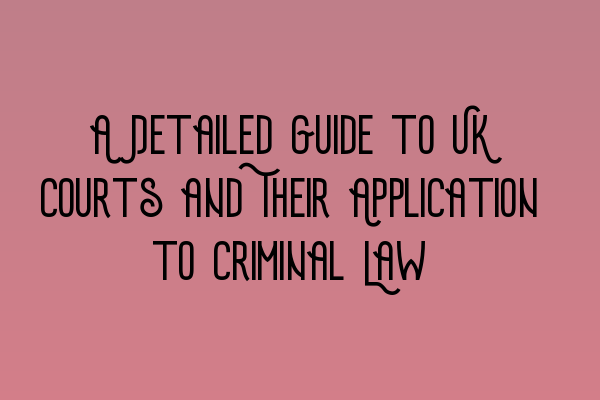A Detailed Guide to UK Courts and Their Application to Criminal Law
Welcome to SQE Criminal Law & Practice Law UK! As a solicitor and expert in criminal law, I am here to provide you with a detailed guide to UK courts and their application to criminal law. Understanding the structure and function of the UK court system is essential for anyone practicing or studying criminal law in the UK.
Overview of the UK Court System
The UK court system is hierarchical in nature, consisting of multiple courts with varying levels of jurisdiction. This hierarchical structure ensures that cases are heard and resolved at the appropriate level of authority.
The highest court in the UK is the Supreme Court, which is the final court of appeal for all legal cases. It deals with matters of general public importance and significant legal issues. The decisions made by the Supreme Court are binding on all lower courts.
Beneath the Supreme Court are the three main divisions of the Court of Appeal: the Civil Division, the Criminal Division, and the Family Division. The Court of Appeal hears appeals from decisions made by lower courts, ensuring that legal errors are corrected and justice is served.
At the next level are the High Courts of England and Wales, which consist of three divisions: the Queen’s Bench Division, the Chancery Division, and the Family Division. The High Court has jurisdiction over a wide range of civil and criminal matters, including serious criminal cases.
Below the High Court are the Crown Courts, which are presided over by judges and handle serious criminal cases. These courts have the power to hear all criminal offences and are where trials take place for the most serious crimes, such as murder and rape.
Application of UK Courts to Criminal Law
Now that we have an overview of the UK court system, let’s dive into how these courts apply to criminal law.
The Magistrates’ Court is the lowest level of criminal court in the UK. It deals with less serious criminal offences, such as minor assaults, theft, and traffic offences. Magistrates, who are trained volunteers, hear these cases and make rulings based on the evidence presented.
For more serious criminal offences, the case is transferred to the Crown Court. The Crown Court is equipped with greater powers and resources to handle complex criminal trials. A judge, along with a 12-member jury, presides over the trial and delivers a verdict based on the evidence presented.
If an individual is found guilty in the Crown Court, they may appeal against the conviction or sentence to the Court of Appeal Criminal Division. This division reviews the case to determine if any legal errors or miscarriages of justice have occurred.
If the Court of Appeal Criminal Division upholds the conviction, the final avenue of appeal is the Supreme Court. However, it’s important to note that the Supreme Court only hears cases of legal significance or public importance.
Conclusion
Understanding the UK court system is crucial for anyone involved in criminal law. From the Magistrates’ Court to the Supreme Court, each court plays a vital role in ensuring justice is served and legal errors are corrected.
If you’re preparing for the SQE 1 or SQE 2 exams, it’s important to have a strong grasp of the UK court system and its application to criminal law. Make sure to check out our related articles for SQE exam preparation:
- SQE 1 Practice Exam Questions
- SQE 1 Practice Mocks FLK1 FLK2
- SQE 2 Preparation Courses
- SQE 1 Preparation Courses
- SRA SQE Exam Dates
Good luck with your studies and future practice in criminal law!
